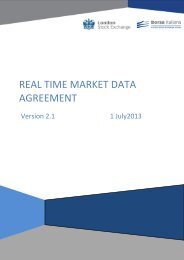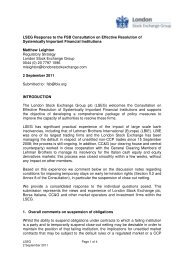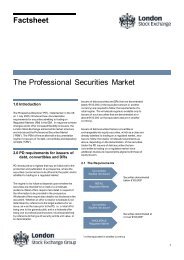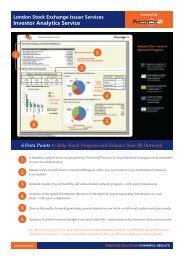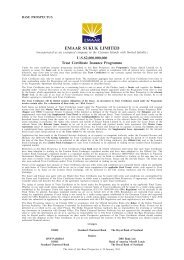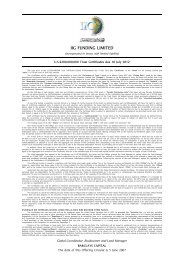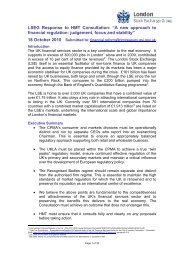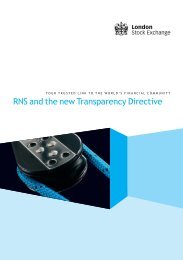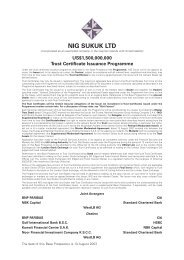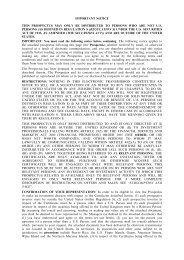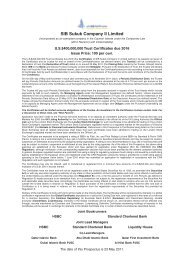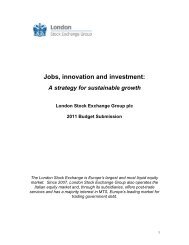LSEG Response to IOSCO Consultation - London Stock Exchange
LSEG Response to IOSCO Consultation - London Stock Exchange
LSEG Response to IOSCO Consultation - London Stock Exchange
Create successful ePaper yourself
Turn your PDF publications into a flip-book with our unique Google optimized e-Paper software.
traded in more than one venue, or which have active s<strong>to</strong>ck options or s<strong>to</strong>ckfutures, also typically have higher order-<strong>to</strong>-trade ratios.35 <strong>IOSCO</strong> will be aware of the work done by the Canadian authorities regarding aregula<strong>to</strong>ry fee structure that imposes a cost in proportion <strong>to</strong> a marketparticipant’s order activity, rather than executed trades; it would be interesting<strong>to</strong> see whether this had any measurable impact on trading strategies.Question 12 – Should market opera<strong>to</strong>rs be required <strong>to</strong> make their co-locationservices available on a fair and non-discrimina<strong>to</strong>ry basis?36 We agree that access <strong>to</strong> co-location facilities should be provided on a nondiscrimina<strong>to</strong>rybasis. The same market access offering and related incentivesshould be offered <strong>to</strong> all participants. This should not mean that co-locationspace has <strong>to</strong> be limitless – provided it is open <strong>to</strong> all market participants then itshould be a commercial service based on supply and demand and should beable <strong>to</strong> be priced accordingly.37 In assessing co-location from the point of view of fair market access, we wouldalso highlight that the information provided on the costs and speeds of colocationmust be correct, clear and not misleading, so that market participantsare unambiguously and transparently informed about costs and technicalspecifications.Question 13 – Should market opera<strong>to</strong>rs be required <strong>to</strong> provide testingenvironments <strong>to</strong> enable participants in stress test their algorithms? If so, whatkind of minimum requirements are reasonable?38 We do not believe that market opera<strong>to</strong>rs should be required <strong>to</strong> provide testingenvironments for stress testing algorithms. To do so would be incredibly difficult<strong>to</strong> achieve in practice and expensive <strong>to</strong> implement, as it would requiresimulating a trading environment with parameters that may change in response<strong>to</strong> different externalities (and are therefore difficult <strong>to</strong> model).39 However, the <strong>London</strong> S<strong>to</strong>ck <strong>Exchange</strong> Group does provide range of cus<strong>to</strong>mertesting services that allow our members <strong>to</strong> test their systems, and ensure thatthey are fully operational and effective. 10 It is our belief that all trading venuesmust offer this service as part of its arrangements for effective systems andcontrols.40 <strong>LSEG</strong> also stress tests its systems <strong>to</strong> ensure that their capacity can meetdemand and handle potentially high message volumes during times of highmarket volatility. Further, as discussed in question 4, volatility controls andcircuit breakers are deployed <strong>to</strong> ensure that trading in particular financialinstruments remains orderly. We consider that this is a more effective way ofmaintaining orderly markets.10 For more information, please visit http://www.londons<strong>to</strong>ckexchange.com/products-andservices/technical-library/cus<strong>to</strong>mer/cus<strong>to</strong>mer-testing-services.htmPage 10 of 11



